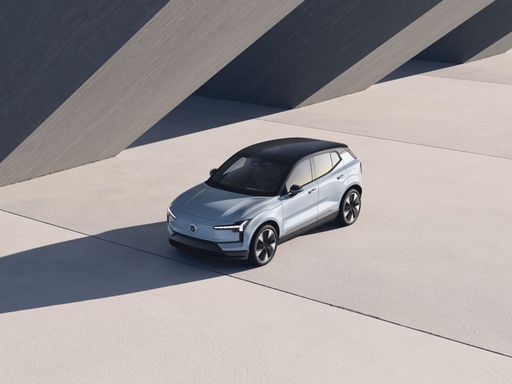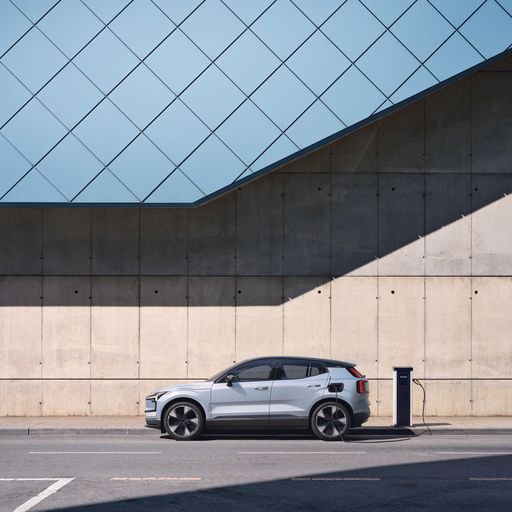Toyota Yaris vs Volvo EX30 - Differences and prices compared
Costs and Efficiency:
Looking at overall running costs, both models reveal some interesting differences in everyday economy.
Toyota Yaris has a convincingly advantage in terms of price – it starts at 21900 £, while the Volvo EX30 costs 33000 £. That’s a price difference of around 11134 £.
Engine and Performance:
Power, torque and acceleration are the classic benchmarks for car enthusiasts – and here, some clear differences start to show.
When it comes to engine power, the Volvo EX30 has a clearly perceptible edge – offering 428 HP compared to 280 HP. That’s roughly 148 HP more horsepower.
In acceleration from 0 to 100 km/h, the Volvo EX30 is decisively quicker – completing the sprint in 3.60 s, while the Toyota Yaris takes 5.50 s. That’s about 1.90 s faster.
In terms of top speed, the Toyota Yaris performs noticeable better – reaching 230 km/h, while the Volvo EX30 tops out at 180 km/h. The difference is around 50 km/h.
There’s also a difference in torque: Volvo EX30 pulls distinct stronger with 543 Nm compared to 390 Nm. That’s about 153 Nm difference.
Space and Everyday Use:
Whether family car or daily driver – which one offers more room, flexibility and comfort?
Seats: offers more seating capacity – vs .
In curb weight, Toyota Yaris is convincingly lighter – 1090 kg compared to 1840 kg. The difference is around 750 kg.
In terms of boot space, the Volvo EX30 offers to a small extent more room – 318 L compared to 286 L. That’s a difference of about 32 L.
In maximum load capacity, the Volvo EX30 performs minimal better – up to 1000 L, which is about 65 L more than the Toyota Yaris.
When it comes to payload, Toyota Yaris noticeable takes the win – 525 kg compared to 390 kg. That’s a difference of about 135 kg.
Who comes out on top?
Overall, the Volvo EX30 shows itself to be dominates this comparison and secures the title of DriveDuel Champion.
It convinces with the more balanced overall package and proves to be the more versatile choice for everyday use.
 @ Volvo Cars
@ Volvo Cars
Volvo EX30
Costs and Consumption
View detailed analysis
Engine and Performance
View detailed analysis
Dimensions and Body
View detailed analysis
Toyota Yaris
The Toyota Yaris is a sprightly city hatch that packs clever packaging, surprising comfort and fuel-sipping manners into a neat, easy-to-park package. It rewards sensible buyers with low running costs, friendly ergonomics and a forgiving drive, delivered with Japanese reliability and just enough personality to make errands feel a little less ordinary.
details @ Toyota Motor Corporation
@ Toyota Motor Corporation
 @ Toyota Motor Corporation
@ Toyota Motor Corporation
Volvo EX30
The Volvo EX30 arrives as a compact electric with crisp Scandinavian design and a cheeky personality, proving you can be serious about safety and still enjoy a grin on your commute. Its cabin is cleverly packaged and delightfully easy to live with, offering smart tech and practical touches that make it feel like a grown-up's city car with a sense of fun.
details @ Volvo Cars
@ Volvo Cars
 @ Volvo Cars
@ Volvo Cars
 @ Volvo Cars
@ Volvo Cars
 @ Volvo Cars
@ Volvo Cars
 @ Volvo Cars
@ Volvo Cars
 @ Toyota Motor Corporation
@ Toyota Motor Corporation
|
 @ Volvo Cars
@ Volvo Cars
|
|
|
|
Costs and Consumption |
|
|---|---|
|
Price
21900 - 46700 £
|
Price
33000 - 49100 £
|
|
Consumption L/100km
3.8 - 9.5 L
|
Consumption L/100km
-
|
|
Consumption kWh/100km
-
|
Consumption kWh/100km
17 - 18.7 kWh
|
|
Electric Range
-
|
Electric Range
339 - 476 km
|
|
Battery Capacity
-
|
Battery Capacity
49 - 65 kWh
|
|
co2
87 - 215 g/km
|
co2
0 g/km
|
|
Fuel tank capacity
36 - 50 L
|
Fuel tank capacity
-
|
Dimensions and Body |
|
|---|---|
|
Body Type
Hatchback
|
Body Type
SUV
|
|
Seats
4 - 5
|
Seats
5
|
|
Doors
3 - 5
|
Doors
5
|
|
Curb weight
1090 - 1356 kg
|
Curb weight
1840 - 1960 kg
|
|
Trunk capacity
141 - 286 L
|
Trunk capacity
318 L
|
|
Length
3940 - 3995 mm
|
Length
4233 mm
|
|
Width
1745 - 1805 mm
|
Width
1838 mm
|
|
Height
1455 - 1500 mm
|
Height
1550 - 1567 mm
|
|
Max trunk capacity
935 L
|
Max trunk capacity
1000 L
|
|
Payload
289 - 525 kg
|
Payload
370 - 390 kg
|
Engine and Performance |
|
|---|---|
|
Engine Type
Full Hybrid, Petrol
|
Engine Type
Electric
|
|
Transmission
Automatic, Manuel
|
Transmission
Automatic
|
|
Transmission Detail
CVT, Manual Gearbox, Automatic Gearbox
|
Transmission Detail
Reduction Gearbox
|
|
Drive Type
Front-Wheel Drive, All-Wheel Drive
|
Drive Type
Rear-Wheel Drive, All-Wheel Drive
|
|
Power HP
116 - 280 HP
|
Power HP
272 - 428 HP
|
|
Acceleration 0-100km/h
5.5 - 9.7 s
|
Acceleration 0-100km/h
3.6 - 5.7 s
|
|
Max Speed
175 - 230 km/h
|
Max Speed
180 km/h
|
|
Torque
390 Nm
|
Torque
343 - 543 Nm
|
|
Number of Cylinders
3
|
Number of Cylinders
-
|
|
Power kW
85 - 206 kW
|
Power kW
200 - 315 kW
|
|
Engine capacity
1490 - 1618 cm3
|
Engine capacity
-
|
General |
|
|---|---|
|
Model Year
2024 - 2025
|
Model Year
2024 - 2025
|
|
CO2 Efficiency Class
B, G
|
CO2 Efficiency Class
A
|
|
Brand
Toyota
|
Brand
Volvo
|
Is the Toyota Yaris offered with different drivetrains?
The Toyota Yaris is offered with Front-Wheel Drive or All-Wheel Drive.
The prices and data displayed are estimates based on German list prices and may vary by country. This information is not legally binding.
